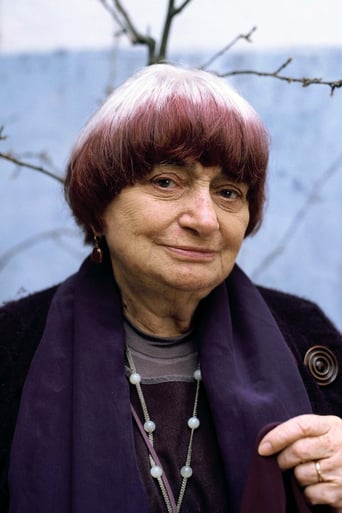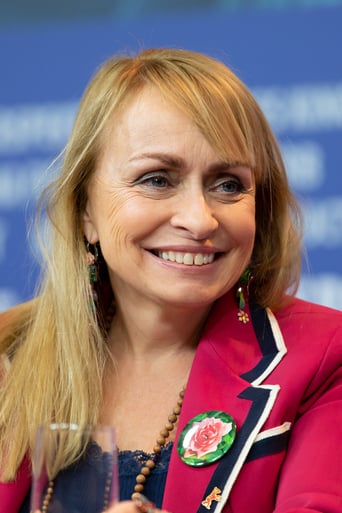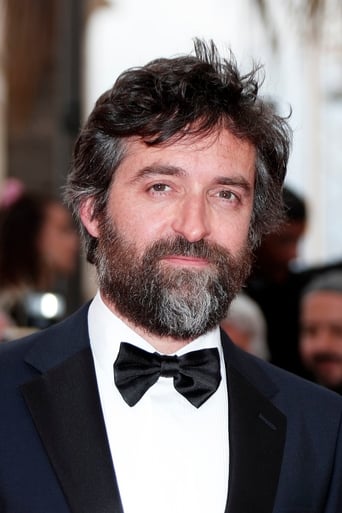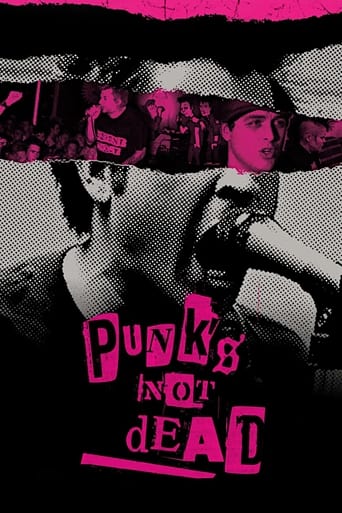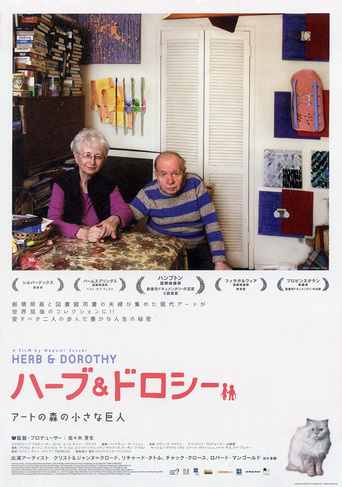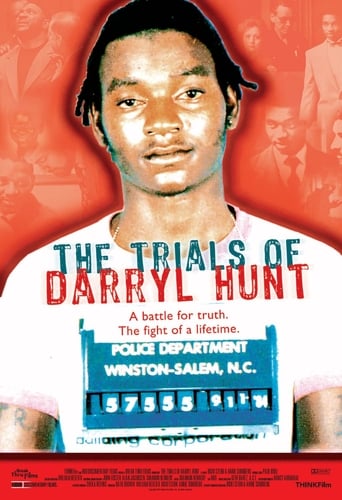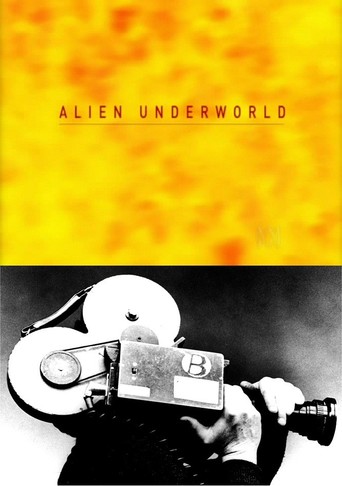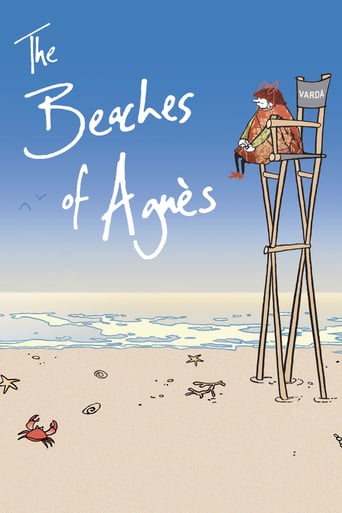
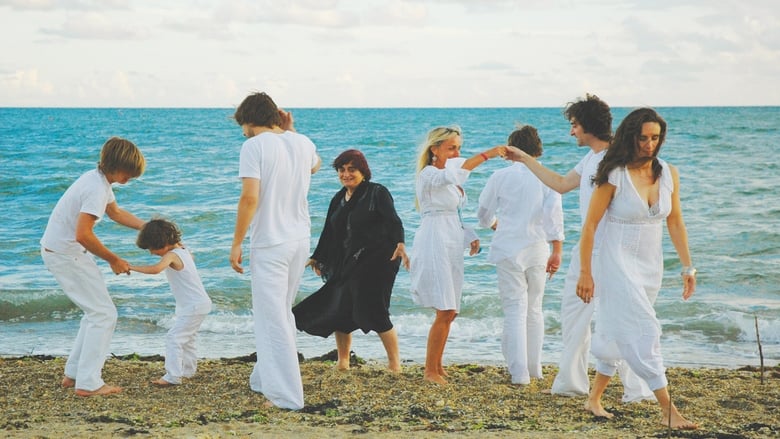
The Beaches of Agnès (2008)
Filmmaking icon Agnès Varda, the award-winning director regarded by many as the grandmother of the French new wave, turns the camera on herself with this unique autobiographical documentary. Composed of film excerpts and elaborate dramatic re-creations, Varda's self-portrait recounts the highs and lows of her professional career, the many friendships that affected her life and her longtime marriage to cinematic giant Jacques Demy.
Watch Trailer
Cast


Similar titles
Reviews
Highly Overrated But Still Good
Great Film overall
A Masterpiece!
It’s fine. It's literally the definition of a fine movie. You’ve seen it before, you know every beat and outcome before the characters even do. Only question is how much escapism you’re looking for.
Granted, I am a huge fan of Agnès Varda's work—and persona. I've seen most of her American releases, which are, unfortunately, far fewer than the 46 films she's directed. Sorry to report that even Netflix only stocks 8 of her films; my local video store and library system, not even 1.Eighty-one-year-old Varda is, first and foremost, a poet who happens to be holding a video camera. And with this, her autobiography, she quickly brings us into the stream of consciousness of her brilliant mind, regaling us with both fantastic images, filmic experiments, and words rendered so quietly and sweetly that it belies their utter veracity. With the fluidity of a Russian ballerina, she weaves still photos, clips from her films, present- day documentary footage, and fictional re-creations.A viewer with a familiarity of her oeuvre will obviously take away greater understanding and enjoyment of this recounting of her life and work. Yet, I believe it's accessible even for the uninitiated, as a tribute to an artist and iconoclast who sustains a strong vision and keen insight into life and art. And a great big heart." 'If we opened up people, we'd find landscapes.' If we opened up me, we'd find beaches," she begins, an apt conceit for the half-Greek filmmaker who has lived her life near the sea. And thus, in the film's opening shots, she constructs a web of mirrors propped on easels in the sand, reflecting the incoming waves. These are fancy, gilded, furniture mirrors, large and small, capturing both la plage and Varda's reflection as she begins the narrative of her childhood. In and of itself, it's a beautiful installation piece—greatly enhanced by the reflexive quality of a sea of cameras filming themselves. Moments later, she sets up family photos on blades of grass in the sand. While discussing an image of herself and her sister in their bathing suits, two little girls appear in current time, wearing the same sorts of suits. "I don't know what it means to re-create a scene like this. Do we relive the moment?" Varda wonders. But her answer seems less about reconstructing the past (this is not a wistful film like Bergman's Wild Strawberries), but more about delight in her powers as a magician with a camera. "For me, it's cinema, it's a game," she says.Some of the film's sweetest moments derive from shots of her family—her two children and late-husband, fellow New Wave auteur Jacques Demy (The Umbrellas of Cherbourg). She obviously has great affection for the "peaceful island," as she describes them. In one lovely scene, the extended family is dressed in white gauze, frolicking. "Together they're the sum of my happiness. But I don't know if I know them, or understand them. I just go toward them."Varda employs an unusual technique of re-creating the major moments of her life/films while bringing her current self into the proceedings. In the age of social networking a la Facebook, with gambits toward entering the past as we simultaneously dwell in the present, this seems a very contemporary notion. With the gift of memory, we both do and don't inhabit all of the times of our life at once. As she states, "I live. And as long as I live, I remember."One of La Varda's most lovable traits is how utterly herself she can be. Her 8-decade-old hair sports its trademark bowl cut, yet in some scenes is colored almost parfait-like (sans cerise) with white on top and deep red around the ends—gloriously unconventional, and wry. And indeed her sense of humor is continually present. She also has the good sense not to take herself completely seriously. After revisiting her early home in Brussels and discovering that it is now inhabited by an avid train enthusiast who prattles on about his collection, she concludes, "The 'childhood home' part was a flop."In 55 years of making films, the director has clearly spent ample time pondering the art of her craft. As she notes, "I think I've always lived in it." This is obviously so, and without traditional tutelage. She claims to have made her directorial debut, La Pointe-Courte, after having taken in just 10 films in her first 25 years. This greatly flouted convention within French film-making of the time, in which training and credentials were paramount. Much of the film concerns images and the context of their creation— the process of birthing, what prompts images into being, the results of their existence, the ripple effects of the filmmaker's art, and the inextricable link between maker and film.Although Varda includes reenactments in this walk backward, she also allows the viewer to be in on their making. It's as if she hopes to underscore the artifice and revels in the fact that we will knowingly suspend our disbelief anyway. In one scene, she sets up a production office atop sand dumped on a city street.The movie's final scene reveals Varda's "shack," a studio she's recently built on the beach. The filmmaker-as-architect metaphor made real, its walls are constructed of strips of celluloid from a 1966 film in carefully chosen colors, bathed in light. The structure is fragile yet appears solid. This is a wondrous metaphor, one that seems to encapsulate the artist's spirit and life. "In here, it feels like I live in cinema," she notes.
"The Beaches of Agnes" is an autobiographical documentary done in a uniquely impressionistic style. The subject is Agnes Varda, the legendary French director who began her career in the 1950s and, who at the age of 80, shows that she is still a master of her art and craft. For not only does Varda provide the voice-over narration for the film, but she conceived and directed the project as well.Varda uses as her focal point the various beaches where she spent a great deal of her time growing up. It is to these places that she has brought a crew of filmmakers to shoot her delivering extended monologues on her life and to restage - often in a cleverly amusing and surrealistic style - memories and events that have remained with her throughout the years. When she has actual photos and file footage from the past, she is quick to use them, but when she doesn't, she turns to present-day re-creations to fill in the gaps. But all is not limited to the beach, for she frequently heads inland to retrace the steps of her life, visiting key locations along the way.She explores her childhood, when she lived much of the time on a houseboat; her teen years, when she was thoroughly ignorant of what a woman could do in the world and of the realities of man/woman relationships; her experiences during the War and the Occupation, when most French citizens "lived day to day;" her years studying art at the Ecole du Louvre; her first taste of freedom and independence when she stole off one night all on her own to Corsica; her time spent as a fisherman; her burgeoning fascination with photography; her marriage to fellow director and film-making inspiration, Jacques Demy; her role as mother and grandmother; her trips to Cuba and Southern California in the 1960s to capture in photos and on film the turbulent nature of that period; her fervent pro-feminist leanings that often found their way into her movies; and her eventual transition to film-making herself to become the only female figurehead of the French New Wave, an otherwise Young Boys' Club that included, in addition to Demy, Godard, Truffaut, Resnais, and various other cinematic masters.It is here that the movie turns to Varda's career as a filmmaker, as the artist herself discusses her inspirations, her key themes and concerns, and the logistical problems of the movie-making process itself. The movie provides us with a generous sampling of clips from not just her own movies but those of Demy as well.As she reflects back on her life, Varda addresses the issues of aging, memory, and personal loss (especially of her beloved Jacques, who died of AIDS in 1990). She views the sea as representative of permanence - and human beings and their foreshortened life spans as symbols of the universe at its most temporal. Through its mixing of the real with the surreal, the literal with the figurative, "The Beaches of Agnes" mirrors the hybrid nature of Varda's photographic and cinematic works themselves.But the movie is often at its most charming when it is content to simply BE, when some seemingly random image, person, event or thought comes along to capture Varda's complete and undivided attention - a testament to her astute powers of observation, to her complete and utter absorption in the moment, and to her ability to make art out of the raw materials of actual life.And isn't that what movie-making is really all about, after all?
I was fortunate to catch (October 30, 2009 in SF) "The Beaches of Agnès" aka "Les Plages d'Agnès" 2008, in French with English subtitles. Agnès Varda is 80 (in 2008) and still so lively, creative, imaginative, giving us delightful reminiscing of The New Wave film period, including the young and the old. What a filmmaker, cinematic lover, unique lady, she is. Besides being a retrospective look at Varda's cinematic life (so far), the film also serves as a loving dedication to the close to 30 years she shared with her husband Jacques Demy - the fabulous w-d-filmmaker who gave us the popular French films entirely sung musically: "The Young Girls of Rochefort" 1967 and "The Umbrellas of Cherbourg" 1964 (Catherine Deneuve was in both of these two gems).If you like movies, film history, graphic design, visual play on imagery (or affiliated to none of the above), you will (still) feel akin to Varda's 'Beaches' whether you thoroughly understands French, speaks the language, been to Paris-France, or not. She has delivered a cinematic journey of going through the various phases of her life, experiences in film-making, and added her unique stamp of Agnès Varda sensibility. It's a good place to be and 'tis fun to hang around with her. As my favorite Emily Dickinson epigram says: Delight has no Competitor, so it is always most. Yes, Agnès Varda is alive and well and still full of humor, bemused or otherwise - a fantastic spirited woman, ever the innovative-discovery eye afresh, so full of wisdom, be it wistful or witty.This film is a great companion piece for viewing with her loving remembrance of Demy: Jacquot De Nantes (1991), which is in Black & White, and Color, documented the hometown childhood origin which grew into the lifelong cinematic passion of Jacques. Another enjoyable Varda-Demy film, anytime.There is an accessible official site USA at "cinemaguild.com/beachesofagnes" and the trailer at "cinemaguild.com/beachesofagnes/trailer.html". Looks like DVD is available, released on March 2, 2010.
Agnès Varda today is an impressive women, whose present self is woven throughout this poetic film autobiography. At eighty (a surprise birthday celebration decorates the end credits) she is spry of body and vigorous of mind, inventive and alive, looking forward as well as back in this poetic film autobiography. She blends living tableaux, installations, old footage, voice-over, interviews. She is ever present, talking, inventing, directing, symbolically (and actually, on camera) walking backward. The result is far too beautiful to call "documentary portrait." Remembering the film, one thinks of Agnès at various ages, always with the same shiny dark cloche of hair (allowed to grow white in some shots) and the same solid, mobile form. One also remembers circus acrobats performing on a beach; a carnivalesque film office set up in the sand. One thinks of Agnès with Demy, and his sweet, sad face; her children and grandchildren, dressed in white and cavorting around her for the camera 'contre jour', into the sun, on the sand with the sea behind them, glorious and handsome and Mediterranean. This is a celebration of cinema and of life.She does not forget to talk about the Nazis and the extermination camps, or her schoolgirl songs celebrating the collaborationist government of Pètain and Vichy. Or her sadness about all the great people she photographed and knew who are gone. Or her anger about the exploitation of women.But Beaches of Agnès is also not without deliberate lacunae. How did the love of her life, her husband, her co-director on his famous Umbrellas of Cherbourg, happen to die of AIDS? Everybody is talking to her, so they tell her what she wants to hear. There's nothing wrong with that, because we want to hear it too. Yet with the poetry and beauty one's left in a bit of a daze, because film fiction and film fact and reenactment and chronology are interwoven so cunningly and rapidly you need a chronology and a stop button, which are not provided. The fluidity of it is quite enchanting. But it doesn't exactly leave you with a precise knowledge of this wonderful, long life that's probably not near its creative end. (After all, we already live in an age of 80-something and 90-something filmmakers. And here is a woman, and women live longer than men.) To hold together such a rich life, Agnès Varda needed a theme, and she feels in everyone there is a landscape, but in her there are beaches; her life has often revolved around them. The eternal theme of woman and water, weave, wave, wife. And if it was difficult to provide unity, that only reflects the richness of the life.Her father was Greek, her mother French; her first name was Arlette; she legally changed it to Agnès at 18. She was born in Belgium, and in 1940 they fled to Sète on the south coast of France (where Kechiche's Secret of the Grain unfolds and she lived her adolescence. After studying photography in Paris and working for the Theatre National Populaire, she came knew everybody, including Godard, Chris Marker, Alain Resnais, Demy of course. Jean Vilar of the national theater, Philippe Noiret, whom she used in her first film, 'Pointe Courte.' In Hollywood she befriended Jim Morrison of the Doors, and to use Harrison Ford in a movie at a time when he was told he had no future in pictures.She covered the Cuban and Chinese revolutions, fought for abortion and other women's issues, was grouped with Marker and Resnais as part of the Nouvelle Vague, lived in and loved LA and was filming the Black Panthers when Paris was in turmoil in June of '68. (In '67, the Summer of Love, she made 'Uncle Yanco,' about her bohemian painter uncle who lived on a houseboat in Sausalito.) She made such classic films as (her first important work) 'Cleo from 5 to 7',, the Bresson-like 'Vagabond'/'Sans toit ni loi;' 'The Gleaners;' 'One Sings, the Other Doesn't.' 'Vagabond' won the Golden Lion in Venice and made Sandrine Bonaire a star. Varda made films about LA murals ('Murs murs') and hippies ('Lions Love,' with Warhol's Viva), and Jane Birkin, and completed three about Jacque Demy after his death. As she points out, light small digital cameras were important for in the making of 'The Gleaners' (perhaps also for 'Vagabond'?).In 2006, at 78, she was invited to do a video and stills installation, "L'Ile et elle" (the island and her: she likes such punning titles), about the island of Noirmoutier--a step forward in a new career that's reflected in the various 'tableaux vivantes' and installations of this film that evoke her past poetically, express her vision, and simply enchant and avoid forever the boredom of the conventional filmed autobiography. She begins with rich use of mirrors on the beach, moving among them and directing and talking to her typically attractive young film crew. In one remarkable sequence, she has the men who worked in one of her early films reassembled, pushing a large cart through the street at night, with a projector mounted on it showing the. Film.She can be a bit maudlin, as she is throwing down roses in a huge installation of her old much enlarged black and white portraits of Gerard Philippe, Philippe Noiret, and other departed stars of her firmament and French cinema's. And when talking about Jacques Demy, she weeps. But mostly she is joyous, and smiles. The fact the cause of Demy's death, AIDS, was kept secret then and for years after she attributes to the stigma attached to the disease in the Eighties.Varda's eliding of distinctions between real and imaginary, documentary and fiction, present and past can be very confusing: distinctions don't mean enough to her. But though things could be more organized and expository, her confusions and confutation's are still beautiful and fascinating to watch.


